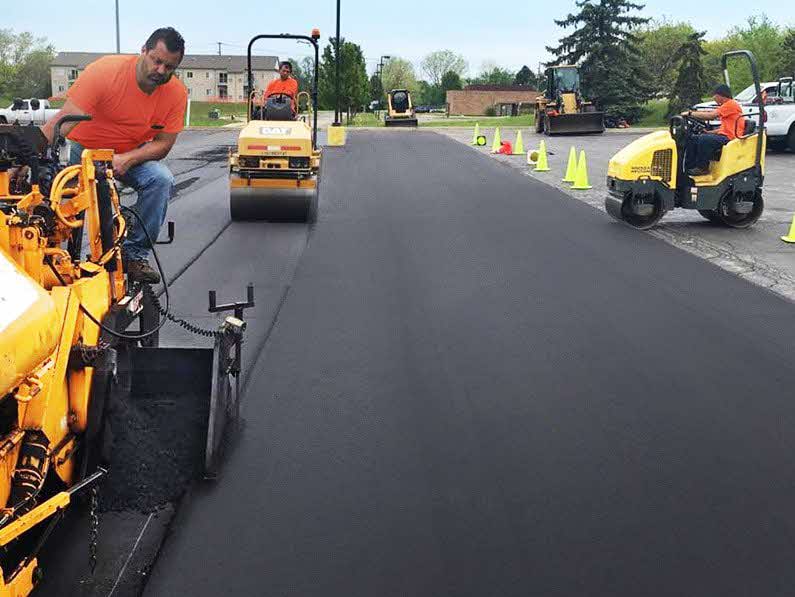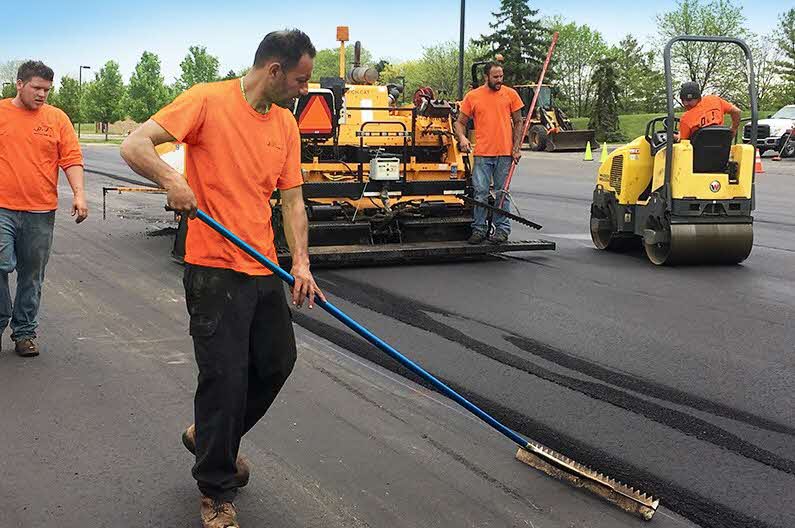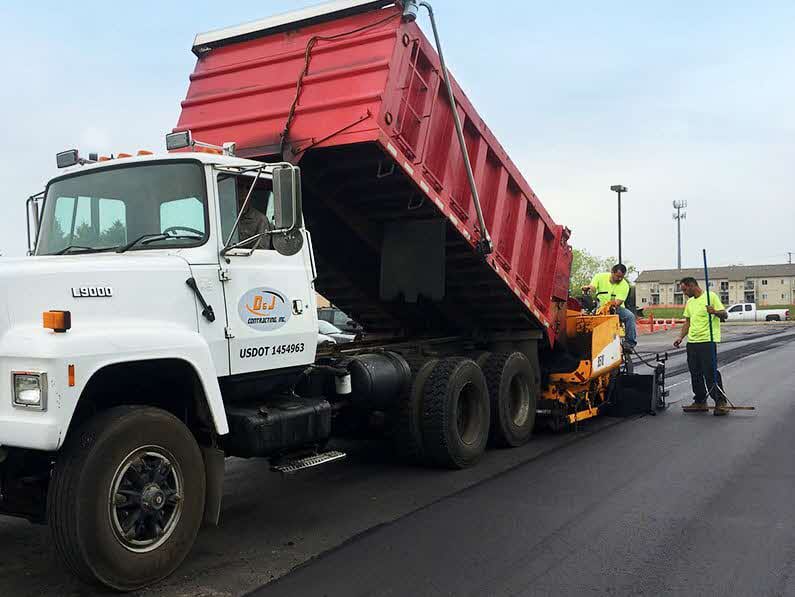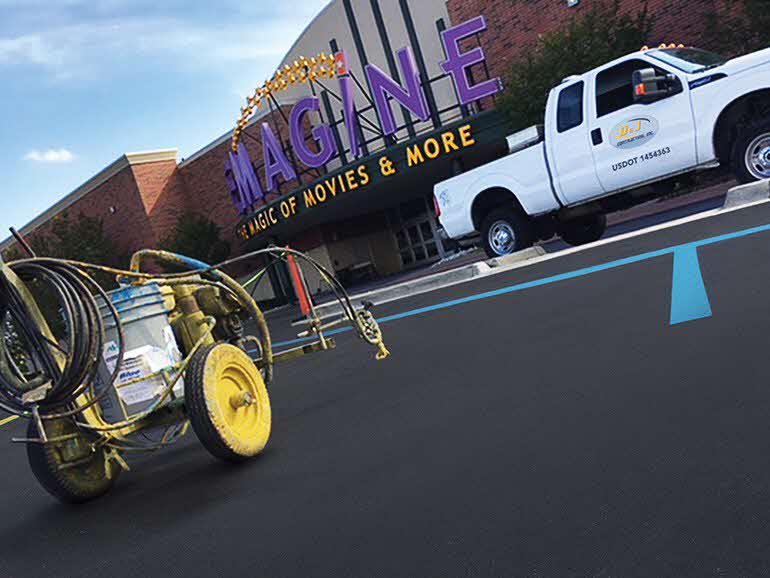Asphalt vs Concrete Preston Corners Michigan
We Are Locally Owned
& Operated For 36 Years
Contact Us Today!
About Asphalt vs Concrete
Introduction: Asphalt vs Concrete
Whether you are preparing to install a new driveway or planning a commercial property project, one critical decision you’ll face is choosing the right material. Two of the most popular options are asphalt and concrete, each with its strengths and limitations. This comprehensive guide will delve into the critical aspects to consider in the Asphalt vs Concrete debate, offering you a wealth of information that will guide you in deciding the best material for your project.
Asphalt and Concrete: A Basic Overview
Asphalt, often referred to as blacktop, and concrete are both reliable materials used for paving driveways, parking lots, and roadways. Asphalt is a black, sticky substance mixed with small stones resulting in a durable, resilient, and flexible surface. On the other hand, concrete consists of cement, sand, and gravel, producing a hard, strong, and long-lasting material. The choice between asphalt and concrete often comes down to factors such as cost, lifespan, maintenance, and aesthetics.
Blacktop Driveway vs Concrete: Main Differences
The primary differences between blacktop (asphalt) and concrete driveways discern in their cost, installation process, maintenance needs, durability, and appearance. The blacktop driveway cost vs concrete is usually a vital consideration for property owners. Typically, asphalt driveways are less costly to install than concrete, making them a popular option for those on a budget. However, it’s also important to consider long-term maintenance costs, including necessary repairs over time.
Cost of Asphalt vs Concrete
The cost of blacktop vs concrete can significantly influence your final decision. Generally, asphalt is more affordable to install upfront than concrete, depending largely on the project size and local material prices. However, the cost of ongoing maintenance and eventual resurfacing must be factored into the full expense of an asphalt driveway over its lifetime. While concrete driveways cost more to install, they require minimal maintenance and often demonstrate greater longevity and resilience, potentially saving expenses over time.
Driveway Paving vs Concrete
When debating driveway paving vs concrete, you should also take into account aesthetic preferences and local climate conditions. Asphalt provides a smooth, continuous black surface, suitable for colder climates due to its ability to absorb and retain heat. Conversely, concrete is more robust in hot climates, as it does not soften with heat as asphalt does. Moreover, with concrete driveway options, you can incorporate various textures and colors for an aesthetically pleasing personal touch.
Paver Driveway Cost vs Concrete
If you are looking for more design flexibility, you may be considering pavers. While pavers provide a visually appealing and unique driveway, they can often be more expensive than both asphalt and concrete. However, the driveway concrete vs pavers cost should be seen in the context of long-term value. Despite their initial expense, paved driveways are extremely durable and almost maintenance-free, potentially offering a higher return on investment in the long run.
Asphalt vs Paver Driveway: A Special Mention
If durability and aesthetics are your prime concerns, you may also want to consider the asphalt vs paver driveway debate. While asphalt provides a clean, polished appearance, pavers offer versatility in design, color, and pattern options. Both materials bring different strengths to the table, so your choice should reflect your unique needs, preferences, and budget.
Conclusion: Making the Right Decision
Ultimately, whether you opt for an asphalt or concrete driveway depends on your specific situation. Accounting for factors like initial installation costs, long-term maintenance expenses, aesthetic appeal, and local climate can help you make an informed decision. We’ve covered the nuances of the asphalt driveway cost vs concrete, blacktop vs concrete driveway cost, and the cost of asphalt vs concrete comprehensively, helping you weigh the pros and cons of each.
Whether you are considering a commercial project or looking to enhance your home’s curb appeal, remember, choosing the right material could significantly impact your property’s functionality and aesthetic charm. As you navigate your way through this important decision, consider reaching out to a local professional to guide you in making a choice that will serve you well for years to come.
No matter what your choice, rest assured that both asphalt and concrete are reliable and respected materials in driveway construction, each with their unique offerings. By now, you should be well-equipped to decide which option – Asphalt or Concrete, is an ideal match for your project needs.
Ready to begin? Contact Us Today!
Whether you’re still settling the ‘Asphalt vs Concrete’ debate, or are ready to begin installation, don’t hesitate to reach out to us. As local pros, we’re more than happy to clarify any doubts or start paving the driveway of your dreams. Contact us today!
Contact Us Today for a FREE
Asphalt vs Concrete Quote






About Preston Corners, Michigan
History
Shelby Township was set off by an act of the Michigan Territorial Legislature on April 12, 1827, and a civil government was organized the following May. It originally included the area that is now Sterling Heights, which was set off March 17, 1835, as the township of Jefferson, renamed to Sterling on March 6, 1838. Utica, located on the southern edge of the township, originally incorporated as a village on March 9, 1838, although that corporation was dissolved soon afterwards. The village was incorporated for a second time on May 10, 1877.
The village of Disco (42°41′02″N 83°02′04″W / 42.68389°N 83.03444°W) was located at what is now the junction of 24 Mile Road and Van Dyke Road. and was platted in 1849. The community never incorporated, although the local high school, the Disco Academy, gained some local recognition and a post office named Disco operated from May 5, 1854, until July 31, 1906. Only a few homes and a namesake on old county road maps remain of this now forgotten historic place. See also: “The Lost Village of Disco” on the Shelby Township Historical Society website.
Geography
Shelby Township is in western Macomb County and is bordered to the west by the cities of Rochester and Rochester Hills in Oakland County. The cities of Utica and Sterling Heights border the township to the south. Mount Clemens, the Macomb county seat, is 11 miles (18 km) to the southeast, and downtown Detroit is 24 miles (39 km) to the south.
According to the United States Census Bureau, the township has a total area of 35.2 square miles (91 km), of which 34.4 square miles (89 km2) are land and 0.8 square miles (2.1 km), or 2.31%, are water. The township is drained by the Clinton River, a tributary of Lake St. Clair.
Neighboring communities:
Communities
There are no incorporated villages and four unincorporated communities:
- Preston Corners is located at the corner of 25 Mile and Schoenherr roads at 42°41′58″N 82°59′45″W / 42.69944°N 82.99583°W. Ira and Deborah Preston bought 400 acres (1.6 km2) of land from the United States government in 1826 and settled on it the following year, later building a sawmill and a picket fence factory.
- Shelby is located at Shelby and 25 Mile Roads (42°41′51″N 83°04′10″W / 42.69750°N 83.06944°W).
- Shelby Village is located where Auburn and Ryan roads intersect. Housing was built in this area in the 1940s.
- Yates is on the boundary with Rochester and Rochester Hills, Oakland County (42°40′25″N 83°05′45″W / 42.67361°N 83.09583°W ; Elevation: 669 ft./204 m.).
Demographics
As of the census of 2010, there were 73,804 people, 28,299 households, and 17,923 families living in the township. The racial makeup of the township was 89.4% White, 3.1% African American, 3.3% Asian, 0.3% from other races, and 1.5% from two or more races. Hispanic or Latino of any race were 2.4% of the population.
The U.S. Census Bureau defined Shelby Charter Township as a census-designated place (CDP) in the 2000 Census so that the community would appear on the list of places (like cities and villages) as well on the list of county subdivisions (like other townships). The final statistics for the township and the CDP were identical. As of the census of 2000, there were 65,159 people, 24,486 households, and 17,923 families living in the township. The population density was 1,878.7 inhabitants per square mile (725.4/km2). There were 25,265 housing units at an average density of 728.5 per square mile (281.3/km). The racial makeup of the township was 94.95% White, 0.85% African American, 0.24% Native American, 2.11% Asian, 0.02% Pacific Islander, 0.45% from other races, and 1.38% from two or more races. Hispanic or Latino of any race were 1.71% of the population.
There were 24,486 households, out of which 33.7% had children under the age of 18 living with them, 62.6% were married couples living together, 7.3% had a female householder with no husband present, and 26.8% were non-families. 21.6% of all households were made up of individuals, and 6.6% had someone living alone who was 65 years of age or older. The average household size was 2.65 and the average family size was 3.13.
In the township the population dispersal was 24.9% under the age of 18, 8.5% from 18 to 24, 31.0% from 25 to 44, 25.1% from 45 to 64, and 10.5% who were 65 years of age or older. The median age was 37 years. For every 100 females, there were 99.6 males. For every 100 females age 18 and over, there were 97.7 males.
The median income for a household in the township was $65,291, and the median income for a family was $76,312. Males had a median income of $59,380 versus $33,844 for females. The per capita income for the township was $30,131. About 2.7% of families and 3.7% of the population were below the poverty line, including 4.1% of those under age 18 and 5.1% of those age 65 or over.
Government
Shelby Charter Township has a Supervisor-Board style township government with elected supervisor, clerk, treasurer and four trustees. The Township operates the Shelby Township Library as well as Cherry Creek Golf Course.
Education
The majority of residents are zoned into Utica Community Schools, which serves parts of the communities of Sterling Heights, Macomb Township, Washington Township, and Ray Township, as well as most of Shelby Charter Township, and all of Utica. However, a small number of residents are zoned into Romeo Community Schools.
Contact Us Today for a FREE
Asphalt vs Concrete Quote
Our Asphalt vs Concrete services are available in Preston Corners as well as all of Macomb County.
Our dedicated team at D&J Contracting Inc is at-the-ready to provide you with great customer service and first class Asphalt vs Concrete services. Reach out to us at (586) 954-0008 to discuss your Asphalt vs Concrete needs today!